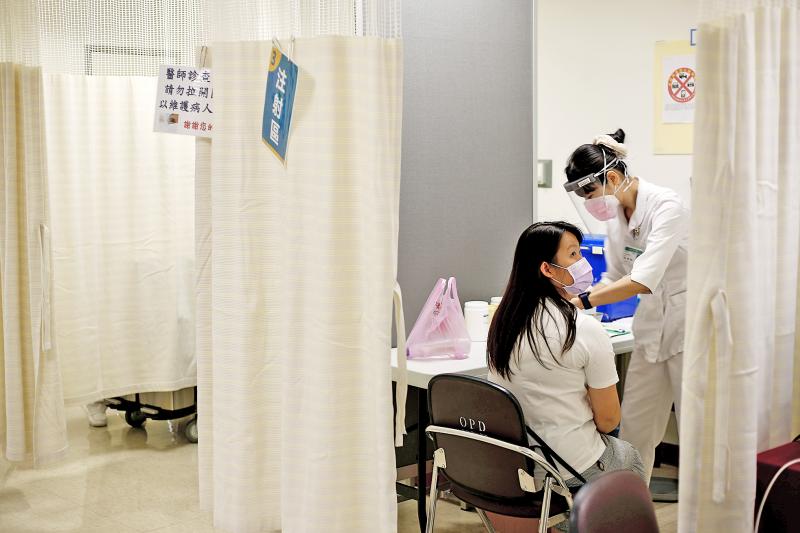US assistance securing more COVID-19 vaccines could serve to protect the critical semiconductor industry at a time of tight chip supplies globally and a rising number of infections in Taiwan, a senior Taiwanese official in New York said in an interview on Thursday.
“While for now the uptick [in COVID-19 cases] hasn’t had an impact, if it lasts too long there could be logistical problems,” Taipei Economic and Cultural Office (TECO) Director-General James Lee (李光章) said. “That’s why it’s urgent. We hope the international community can help release vaccines as soon as possible to help control the outbreak.”
Beyond the humanitarian plea for help fighting the pandemic, Lee’s argument might resonate because of deep concern in US government and business about the shortage of chips used in everything from mobile phones to automobiles.

Photo: Ritchie B. Tongo, EPA-EFE
Taiwan is facing hundreds of untraceable infections after a year of being one of the biggest success stories of COVID-19 containment.
The new surge has been confined so far mainly to Taipei and New Taipei City, and has not affected the operations of major technology firms, including Taiwan Semiconductor Manufacturing Co (台積電), as most of their operations are located farther south.
However, a drought has left hydroelectric plants operating at limited capacity, contributing to power outages in major cities across the nation, including locations where the world’s biggest computer chip businesses operate.
The government earlier this week pledged to try to keep the world supplied with chips and projected a limited impact from its worst outbreak so far. Keeping up production is critical not just for Taiwan’s growth, but because the nation is the world’s main supplier of advanced computer chips.
The concentration of chip manufacturing in Taiwan and a global shortage fueled in part by the COVID-19 pandemic has quickly become a geopolitical issue, with governments around the world racing to secure additional supplies and vowing to build their own locally based chipmaking industries.
Although Taiwan has ranked among the top places in the world in its handling of the pandemic, it has been slower to acquire and distribute shots. So far, only 700,000 doses of AstraZeneca PLC’s COVID-19 vaccine have been delivered to Taiwan.
Representative to the US Hsiao Bi-khim (蕭美琴) yesterday said that she was trying to ensure that Moderna Inc shots the government has ordered arrive next month.
The government is also in talks with the White House to obtain a portion of the 20 million doses of COVID-19 vaccines US President Joe Biden pledged to donate.
Biden on Monday announced that his administration would send doses of the Pfizer Inc/BioNTech SE, Moderna Inc and Johnson & Johnson vaccines, on top of 60 million AstraZeneca doses he had already planned to give to other countries.
“We have talked to the Biden administration and we work closely together,” Lee said. “We expect them to help.”
“The US government has been very supportive of Taiwan and that is under their consideration. We expect that pretty soon the White House will have a decision,” he added.
Additional reporting by Reuters

The CIA has a message for Chinese government officials worried about their place in Chinese President Xi Jinping’s (習近平) government: Come work with us. The agency released two Mandarin-language videos on social media on Thursday inviting disgruntled officials to contact the CIA. The recruitment videos posted on YouTube and X racked up more than 5 million views combined in their first day. The outreach comes as CIA Director John Ratcliffe has vowed to boost the agency’s use of intelligence from human sources and its focus on China, which has recently targeted US officials with its own espionage operations. The videos are “aimed at

STEADFAST FRIEND: The bills encourage increased Taiwan-US engagement and address China’s distortion of UN Resolution 2758 to isolate Taiwan internationally The Presidential Office yesterday thanked the US House of Representatives for unanimously passing two Taiwan-related bills highlighting its solid support for Taiwan’s democracy and global participation, and for deepening bilateral relations. One of the bills, the Taiwan Assurance Implementation Act, requires the US Department of State to periodically review its guidelines for engagement with Taiwan, and report to the US Congress on the guidelines and plans to lift self-imposed limitations on US-Taiwan engagement. The other bill is the Taiwan International Solidarity Act, which clarifies that UN Resolution 2758 does not address the issue of the representation of Taiwan or its people in

SHIFT: Taiwan’s better-than-expected first-quarter GDP and signs of weakness in the US have driven global capital back to emerging markets, the central bank head said The central bank yesterday blamed market speculation for the steep rise in the local currency, and urged exporters and financial institutions to stay calm and stop panic sell-offs to avoid hurting their own profitability. The nation’s top monetary policymaker said that it would step in, if necessary, to maintain order and stability in the foreign exchange market. The remarks came as the NT dollar yesterday closed up NT$0.919 to NT$30.145 against the US dollar in Taipei trading, after rising as high as NT$29.59 in intraday trading. The local currency has surged 5.85 percent against the greenback over the past two sessions, central

US Indo-Pacific Commander Admiral Samuel Paparo on Friday expressed concern over the rate at which China is diversifying its military exercises, the Financial Times (FT) reported on Saturday. “The rates of change on the depth and breadth of their exercises is the one non-linear effect that I’ve seen in the last year that wakes me up at night or keeps me up at night,” Paparo was quoted by FT as saying while attending the annual Sedona Forum at the McCain Institute in Arizona. Paparo also expressed concern over the speed with which China was expanding its military. While the US